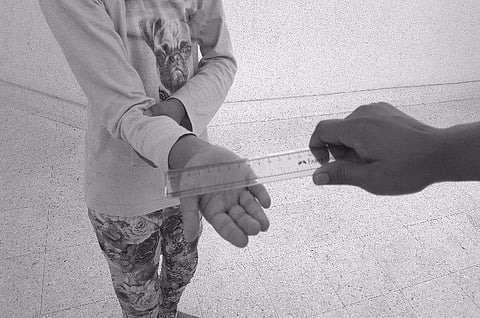

The horrific story of nine-year-old Noufal who was brutalized by his mother, Saleena, in Idukki district, Kerala, has sent shockwaves in the area. The boy was beaten, viciously attacked, locked up and starved by his mother.
Doctors who examined the child say that the torture must have gone on for at least a few weeks, if not months. Noufal’s father had been picked up by excise officials earlier for possession of ganja. Saleena also has a three month old baby.
Extreme cases such as these are exceptions. The abuse in Noufal’s case was sustained, over a period of time, and not inflicted in the heat of the moment because of a sudden ‘provocation’.
Sudden ‘provocation’ is why most parents say they indulge in corporal punishment – a form of punishment that is still fairly common in India when it comes to parents as the inflictors.
KS Selvakumar, a 56-year-old who works in a senior management position in a government society, admits that he has hit his two sons during their childhood as a “last resort”. He says, “It usually happened out of frustration. Once I slapped my college-going son, for not being sensitive to a situation. After every instance of beating them, I've felt guilt and remorse.”
In earlier times, parents had greater license when it came to corporal punishment. Selvakumar says, “During my father's childhood, my grandfather used to lift him by his hair - beating used to be the norm. However, I was never beaten by my parents. I was a single child. My aunt, mother of three boys, routinely resorted to beating my cousins to make them behave.”
Though Selvakumar and his wife do not remember more than a few occasions when they have hit their sons, he says that his children, who are now adults, recall being beaten often.
Vandana*, a 34 year old who works in the IT industry, has a son who has been clinically diagnosed with hyperactivity. She says, “When he was around three years old, he’d just leave my hands and start running on the road in spite of my warnings. He would only stop after being spanked. I felt bad but I was gladder that he was safe.”
It took her quite an effort to stop hitting her child and the impetus for this came from a particular incident that she regrets to this date.
Vandana says, “Once, I took him out for my team outing. He misbehaved, threw tantrums, grabbed people's food - which was totally unexpected and I hit him after we came back home. I was frustrated and felt ashamed before my team mates. Even kids who were younger to him behaved very well. So the punishment was more out of my frustration than for disciplining him .I felt very bad after this incident and took an oath not to hit him anymore.”
Dr Tara Srinivasan, a Chennai-based psychologist, says that repeated corporal punishment only makes children indifferent. “They learn to tolerate the pain and either become withdrawn or imitate the behaviour and turn aggressive,” she explains.
Dr Tara feels that corporal punishment is more accepted and common in the lower classes, where there is already so much violence as part of one’s everyday surroundings.
However, not all children who come to the hospital with bad injuries and even fractures inflicted by their parents are from such homes.
Speaking of the battered baby syndrome, where medical findings reveal injuries – including head trauma – caused by violent shaking of the child, Dr Tara points out that such cases happen when there are unresolved anger issues on the side of the parent.
Postpartum depression, often undiagnosed, can also make a new mother violent towards the child. Saleena, Noufal’s mother, has a three month old baby and a husband who was taken away for illegal activity – was it the frustration that made her turn against her elder son? Not that it justifies her behaviour but could it be a contributing cause? One can only speculate.
When asked about their views on corporal punishment on a Facebook group for mothers, most admitted that they have hit their young child – too young to understand that what it was doing was wrong – because they felt intensely frustrated. While some said that they felt guilty for indulging in corporal punishments, others say that a “whack once in a while” was acceptable. A few, however, were steadfast in their view that no form of corporal punishment was acceptable to them.
The child is usually the person with the least power in a family. Physically and emotionally, s/he is vulnerable. Noufal was willing to defend his mother to the police, claiming that a monkey had attacked him, because she had promised him a biryani if he’d do so. That is how naïve and dependent a child is on his/her parents.
While parents generally do have their child’s best interests in mind, they should pause before taking the violent route to drill a point home. Dr Tara says, “Sitting down and talking to your child is the best way to instil discipline. If that does not work, withhold your love or affection for a while. Take away a few treats. Beating doesn’t solve the problem…it only confuses the child.”
Vandana sums it up: “We grew up hearing proverbs like ‘spare the rod and spoil the child’. I think it’s time we threw these out of the window.”
*Name changed to protect privacy